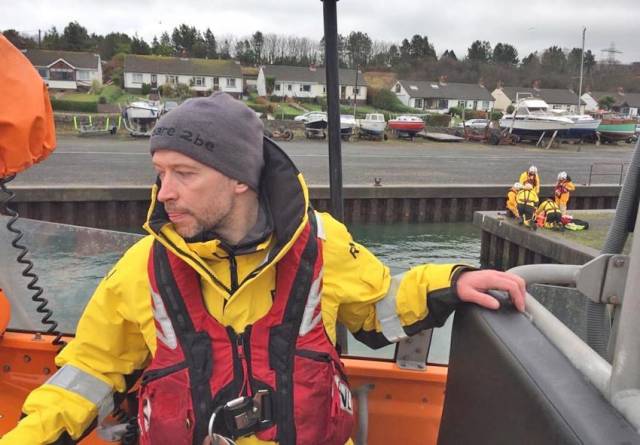Larne RNLI has a close-knit group of volunteers, both crew members and fundraisers, with a strong family ethos and team approach to ensure everyone plays their part to help saves lives at sea on the east Co Antrim coast.
Recently, one of these volunteers — Barry Kirkpatrick, a local teacher — completed his assessments to qualify as an RNLI all-weather lifeboat coxswain.
“Being an RNLI volunteer is a big commitment but working alongside like-minded people, to help those in distress at sea, is very rewarding,” Barry said.
“It’s very much a team approach at Larne RNLI with a fantastic camaraderie within the crew.”
The commitment to the lifeboat isn't only measured in the time spent involved in rescues, but also in the essential weekly training scenarios.
The volunteers in Larne RNLI, who come from all walks of life, train six times per month to ensure they are fully trained on all aspects of rescues including keeping up to date with new and evolving equipment.
With only one in 10 lifeboat crew members having professional maritime experience, the charity’s comprehensive competency-based crew training is vital to saving lives at sea.
And when the pagers do go off, volunteers are ready to drop everything as they’re called away from their families, their beds and their work, 24 hours a day, 365 days a year.
“Our crews train extensively across a broad spectrum to gain the skills and knowledge necessary to be a member of the lifeboat crew,” says Larne RNLI coxswain Frank Healy. “This means giving time and dedication to meet the requirements.
“This was realised recently when Barry, after long, intensive and wide-ranging training, was passed out successfully as an all-weather lifeboat coxswain. A great achievement for Barry who is a very valuable asset to Larne station.”
In 2019 Larne RNLI is celebrating 25 years of local volunteers providing its rescue service to the Larne area. Over the last 25 years, Larne lifeboats have launched 514 times, saving 34 lives and rescuing 454 people, with an average of 21 shouts a year.
To celebrate the work of volunteers and the support the local community have provided, Larne RNLI are holding an open day at the lifeboat station on Olderfleet Road on Saturday 22 June from 12pm-4pm.
Everyone is welcome to come along, meet the volunteers and enjoy a fun-filled day with a BBQ, bouncy castles, our mascot Stormy Stan and lots more.































































